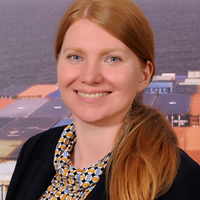Sabine Zeller (09/2020)
Sabine Zeller

About the person
Organisation:
Berufsbildungsstelle Seeschifffahrt e. V. (BBS)
Position:
CEO
Education and professional career:
- University course navigational studies
- 8 years at sea as NWO and Chief Mate, Certificate of Competency as Master
- 3 years self-employed as nautical consultant
- 3 years as teacher of safety courses acc. to STCW
- At BBS for a year
Hobbies
- Motor cycling and cycling
- Playing the drums
- Reading, reading, reading
6 questions about the maritime sector and the German flag
Its unbelievable variety, the combination of freedom and responsibility, the challenges
I read about it – in the "green" booklet by the Federal Employment Agency where all professions and the relevant training are listed alphabetically. I checked from A to N and then I knew for sure that I had found the most versatile, interesting and exciting profession. And I am still convinced of that. Although, it must almost be said that seafaring is a calling. Clearly, it still captivates me, even though I have been ashore for a while now.
Once I had figured out what I wanted to do, it was not so easy to get started. As an Alemannian (colloquialism for Southern Germans) I had no ties to maritime shipping and no clue who I could ask for advice. To complicate matters further, I was spending a gap year in Ireland and was reliant on the (back then) relatively young internet as a source of information. But I made it in the end…
Of course, first of all, to seek advice from my training advisors and me at the BBS. This is one of our core jobs and I think it is incredibly important. There are so many ways, which makes it hard to choose the right path.
Much of the information is given in our brochures and on our website. Currently, in cooperation with our partners of the "Maritimes Bündnis", with ver.di and with support from the BG Verkehr, we are developing a new website for the maritime sector. It is intended to become the central information hub for training and career options in the maritime industry – both land-based and at sea. And of course, it is intended to make the information more accessible to young people.
In accordance with the German Maritime Labour Act, we are the responsible organisation for maritime training. This means, we are also responsible for the approval of ships as training places. The apprenticeship as a ship's mechanic has to occur on board merchant ships flying the German or a European flag, in accordance with Maritime Vocational Training Ordinance (See-BAV). We work closely together with the German Flag State Authorities to implement training standards and continuously improve them.
Especially, the current crisis highlights the strengths of the German Flag. The reaction to the pandemic and its challenge was swift, EU regulations were implemented promptly and emergencies were responded to quickly and competently.
The idea to address current issues in the FAQs of the website www.deutsche-flagge.de/en/coronavirus was quite successful, in my opinion.
I think the German Flag has proven that it is a reliable partner with quick and competent support.
I think that as a consequence of the current situation, the reliability of the German Flag poses an argument for some shipowners that may lead them to rethink, i.e. to reflag.
In case of problems arising from the pandemic and the resulting measures, hardly any other flag supports their shipowners to this extent.
I do not doubt that a strong German Flag is important for the maritime location Germany. How grave consequences can become if the dependency on other states in terms of supplying the country and its people is too large does not take much imagination anymore.


